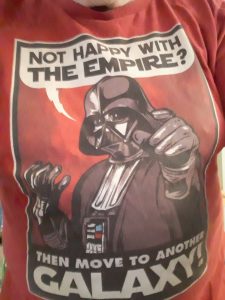 It’s a curious thing that the people who say you should leave the country if you don’t like it are so often the ones who favor legal barriers to doing it. Having the option is a valuable freedom, though.
It’s a curious thing that the people who say you should leave the country if you don’t like it are so often the ones who favor legal barriers to doing it. Having the option is a valuable freedom, though.
We take for granted the freedom of Americans to travel from one part of the country to another, or at least we did until 2020. Now governments are imposing interstate travel restrictions in a futile attempt to contain a virus which is already on both sides of every state line. Shortly before I started writing this, I learned that if I travel six miles to Massachusetts, I now have to show a recent negative COVID-19 test or quarantine for 14 days. I don’t know how they plan to enforce it. Putting checkpoints on every road that crosses the state line would be ridiculous. Maybe they’ll pull over cars with out-of-state plates and demand test documentation. Maybe friends and family members will start standing on opposite sides of the state line to talk to each other as the police watch to make sure they don’t step over the border.
The freedom to “vote with your feet” is the topic of Ilya Somin’s book, Free to Move. Somin is probably best known for his writing in the collaborative legal blog “The Volokh Conspiracy.” He presents an argument for maximizing the freedom to relocate from one country, state, or town to another.
This isn’t a book to get people marching in the streets for the cause. The Trump Wall barely gets a mention. Somin makes his case dispassionately, with more abstract reasoning than specific cases. There are lots of endnotes. It’s the kind of book that can have a long-term impact without becoming famous.
Somin compares “foot voting” with ballot box voting and finds that the former is often more effective. An individual’s marginal effect on an election is almost always zero. As a result, people have little motivation to inform themselves and vote intelligently. If they decide to find a new home, they have a strong incentive to learn as much as they can. If an area has net emigration or immigration, that’s a message to its government about people’s informed choices. It can put a brake on bad policies and encourage ones that attract people.
It’s often said that foot voting is a luxury for the relatively well-to-do, but Somin notes that the cost of moving is generally less for the poor. Homeowners are tied to their investments, and they have lots of stuff to move. People with very little can just pick up and go. They’ve got nothing to lose. Sometimes it’s people who have had everything taken from them who need to find a new place, one with more stability and less persecution.
There’s a problem which I don’t think Somin addresses sufficiently. The places with the most oppressive governments are the ones people would most like to leave. Their governments, though, don’t want them to escape. This was obvious in the Soviets’ closed borders and especially the Berlin Wall. Somin was one of the lucky ones; he and his family were able to leave the USSR for the United States in 1979, when he was five years old. The truly totalitarian states, like North Korea, are the hardest to leave or to get information about destinations. The argument for the freedom to move will fall on deaf ears where it’s needed most.
Free to Move is a worthwhile addition to a library of liberty, especially if you have a strong interest in migration issues.